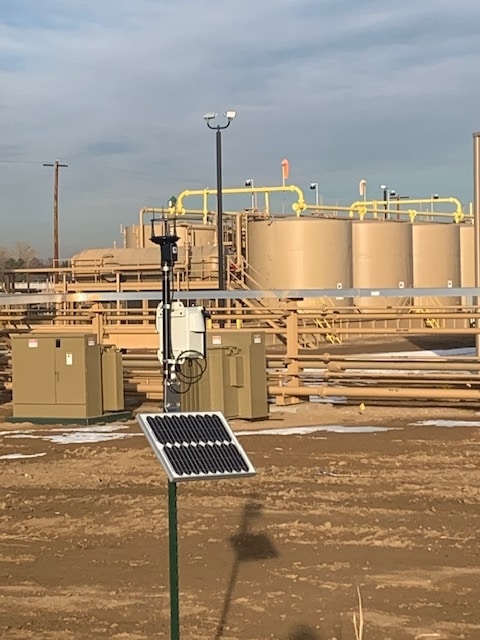 “We have a high level of confidence in our operational practices,” said Steve Struna, Bayswater President and Chief Executive Officer. “This unparalleled commitment and partnership provides us with an additional level of assurance through third-party review of air quality data from our oil and natural gas operations.”
“We have a high level of confidence in our operational practices,” said Steve Struna, Bayswater President and Chief Executive Officer. “This unparalleled commitment and partnership provides us with an additional level of assurance through third-party review of air quality data from our oil and natural gas operations.”
“Colorado has the strictest air regulations in the country, along with the most environmentally responsible oil and natural gas production nationwide. Our continuous monitoring further demonstrates Bayswater’s commitment to environmentally responsible oil and natural gas development and production. This gives our stakeholders, including regulators, local communities, neighbors, and investors, even greater confidence that we adhere to the highest operational standards.”
While also demonstrating the efficacy of continuous air quality monitoring to improve operational processes, partnering with the Colorado School of Mines and Project Canary gives Bayswater access to a leading educational institution and technology provider as it continues to seek to improve environmental, social, and governance (ESG) outcomes for its operations. As the first oil and gas company to commit to continuously monitor the emissions at 99% of production, Bayswater will have the most comprehensive view of their operations. This program is aimed at improving air quality while also providing further assurance that Bayswater is producing oil and natural gas in a safe and responsible manner.
A key objective of this pilot program is collecting air quality data that can help all Colorado operators understand the environmental impacts of well sites during production and reduce overall emissions from oil and natural gas sites. Bayswater is prepared to be a leader in ESG values and plans on using the program to inform their communities and investors of the measurable improvements that can be achieved through such programs.
“We chose to engage with Payne and Project Canary because of the tremendous learning opportunity it provides us to know even more about improving the efficiency of our operations so that we can engage more effectively with the communities where we operate and the regulators who oversee our activities,” said Struna. “Our goal is to demonstrate the low environmental impact of our operations. The best thing we can have is real-time data which affords us the opportunity to continuously improve our health, safety, and environmental performance.”
Within the Continuous Monitoring Program, the Payne Institute will act as an independent reviewer of the data and Project Canary will provide the continuous air monitoring technology. The Project Canary solution was originally developed for NASA by Colorado School of Mines graduates to monitor air quality on space stations and can provide accurate data down to parts per billion, which is significantly more sensitive than most other sensors currently available. Their air monitoring technology takes samples every second and sends an aggregated report of air quality to a secure database every minute. With the Project Canary system, operators can identify emission sources, remediate leaks and respond to other unplanned events faster than any other technology available today. As the Continuous Monitoring Program progresses, the Payne Institute will provide reports covering the results of the aggregated data provided by all participants.
“Bayswater’s significant contribution to this partnership will dramatically increase the amount of data being shared with the Payne Institute, and will really provide clarity as to the emission intensity that all upstream oil and gas operators may be seeing during production,” said Chris Romer, Project Canary Chief Executive Officer and Co-Founder. “Continuous monitoring is a new technology and can dramatically increase the level of insight that operators have into their operations. We are excited about Bayswater’s commitment to this large-scale pilot program, and are dedicated to act as an independent, secure provider of data for all partners in the program.”
“The Payne Institute is focused on providing objective data to help inform decisionmakers in the private and public sectors to address issues of societal concern related to energy and the environment,” said Dr. Morgan Bazilian, Payne Institute Director and Professor of Public Policy. “As this pilot grows beyond Colorado, our institute will be able to provide greater insight into emissions intensity from oil and gas operations.”
About Project Canary
Project Canary, based in Denver, Colorado, is a mission-driven B-Corporation accountable to a double bottom line of profit and the social good. Our goal is to mitigate climate change by helping the oil and gas industry operate on a cleaner, more efficient, more sustainable basis. Our proven technology monitors emissions of methane and VOC on a near-real-time basis, enabling energy producers to rapidly and effectively identify and remediate fugitive emissions. The Project Canary solution is continuous, rugged, simple and affordable. For more information, visit ProjectCanary.com.
About the Payne Institute of Public Policy
The mission of the Payne Institute at Colorado School of Mines is to provide world-class scientific insights, helping to inform and shape public policy on earth resources, energy, and environment. The Institute seeks to link the strong scientific and engineering research and expertise at Mines with issues related to public policy and national security. For more information, visit PayneInstitute.MINES.edu.






